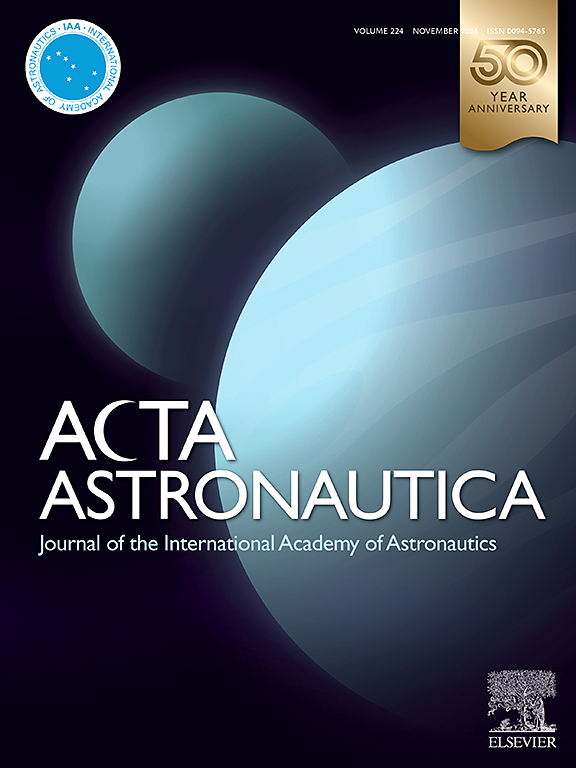三维稀薄离子化高超声速流的灵敏度分析和不确定性量化
IF 3.1
2区 物理与天体物理
Q1 ENGINEERING, AEROSPACE
引用次数: 0
摘要
几十年来,"通信中断 "现象一直困扰着航空航天工业。然而,数值方法的不尽人意和瞬息万变的流入条件使得电子密度的估算并不准确。为了迈出模型校准和防黑洞设计的第一步,人工神经网络和直接模拟蒙特卡罗(DSMC)方法与量子动力学(Q-K)模型相结合,进行了全局灵敏度分析和不确定性量化。考虑到已知不确定性(流入量不确定性)和认识不确定性(反应参数不确定性),对三维 RAM-C II(无线电衰减测量实验的第二次飞行)顶流进行了模拟。在 81 千米大气层和 7.8 千米/秒速度的流入条件下,发现可知的不确定性是电子数量密度,尤其是自由流速度的主要不确定性类型,这意味着飞行器速度的精确测量比模型的校准更为重要。列出了重要性排序,并提出了寻找基本反应的 "三原则"。考虑到两种不确定性,实际值小于标称值的概率为 27%-68%。本文章由计算机程序翻译,如有差异,请以英文原文为准。
Sensitivity analysis and uncertainty quantification for a three-dimensional rarefied ionized hypersonic flow
The “communications blackout” phenomenon has bothered the aerospace industry for several decades. However, the unsatisfying numerical methods and the rapidly changing inflow conditions make the estimation of electrons’ density inaccurate. To lay the first step for model calibration and the anti-blackout design, the Artificial Neural Networks and the direct simulation Monte Carlo (DSMC) method with the quantum-kinetic (Q-K) model are brought together to perform the global sensitivity analysis and uncertainty quantification. The three-dimensional RAM-C II (the second flight of the Radio Attenuation Measurement experiments) head flows are simulated considering aleatory uncertainties (inflow uncertainties) and epistemic uncertainties (reaction parameters uncertainties). Under the inflow condition of an 81 km atmosphere and a velocity of 7.8 km/s, aleatory uncertainties are found to be the dominant type of uncertainty for the number density of electrons, especially the freestream velocity, which means the accurate measurement of the vehicle’s velocity is much more critical than the calibration of the model. The importance ranking is listed, and the “Three rules” for finding the essential reactions are proposed. The probability that the real value is smaller than the nominal value considering both uncertainties is 27%–68%.
求助全文
通过发布文献求助,成功后即可免费获取论文全文。
去求助
来源期刊

Acta Astronautica
工程技术-工程:宇航
CiteScore
7.20
自引率
22.90%
发文量
599
审稿时长
53 days
期刊介绍:
Acta Astronautica is sponsored by the International Academy of Astronautics. Content is based on original contributions in all fields of basic, engineering, life and social space sciences and of space technology related to:
The peaceful scientific exploration of space,
Its exploitation for human welfare and progress,
Conception, design, development and operation of space-borne and Earth-based systems,
In addition to regular issues, the journal publishes selected proceedings of the annual International Astronautical Congress (IAC), transactions of the IAA and special issues on topics of current interest, such as microgravity, space station technology, geostationary orbits, and space economics. Other subject areas include satellite technology, space transportation and communications, space energy, power and propulsion, astrodynamics, extraterrestrial intelligence and Earth observations.
 求助内容:
求助内容: 应助结果提醒方式:
应助结果提醒方式:


